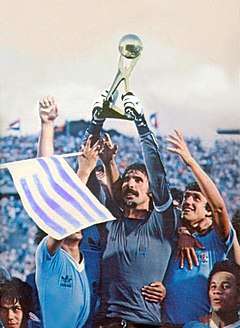1980 Mundialito
| Copa de Oro de Campeones Mundiales Uruguay '80 | |
|---|---|
 Charrúa, the official emblem of the tournament | |
| Tournament details | |
| Host country | Uruguay |
| Dates |
December 30, 1980 January 10, 1981 |
| Teams | 6 (from 2 confederations) |
| Venue(s) | 1 (in 1 host city) |
| Final positions | |
| Champions |
|
| Runners-up |
|
| Tournament statistics | |
| Matches played | 7 |
| Goals scored | 19 (2.71 per match) |
| Attendance | 255,000 (36,429 per match) |
| Top scorer(s) |
(3 goals) |
The 1980 Mundialito (Spanish for "little World Cup"), or Copa de Oro de Campeones Mundiales ("World Champions' Gold Cup"), was a special international football tournament held in Montevideo, Uruguay, from December 30, 1980, to January 10, 1981, in commemoration of the 50th anniversary of the first World Cup tournament, which had been celebrated in 1930 at the same venue. It was organized by FIFA [1]. The national teams invited were Uruguay (hosts), Italy, West Germany, Brazil, Netherlands, and Argentina, at the time the six former World Cup-winning nations except for the Netherlands – 1974 and 1978 World Cup runners-up – replacing England, who declined the invitation due to an already crowded fixture list. The Mundialito was held in the middle of the European football season (December/January) and the English league (as well as its clubs) were reluctant to release their players for a long journey to another continent. FIFA considers Mundialito as a friendly tournament and therefore it is not official.[2]
Participating teams

| Team | Notes |
|---|---|
| Hosts, 1930 and 1950 FIFA World Cup Champions | |
| 1934 and 1938 FIFA World Cup Champions | |
| 1954 and 1974 FIFA World Cup Champions | |
| 1958, 1962 and 1970 FIFA World Cup Champions | |
| 1978 FIFA World Cup Champions | |
| 1974 and 1978 FIFA World Cup Runners-up, replacing |
England, the 1966 FIFA World Cup champions, declined to participate.
Format
The six teams were distributed in two groups of three: Group "A" was composed of Netherlands, Italy, and Uruguay; Group B, of Argentina, Brazil, and West Germany. The winners of each group faced each other to decide the tournament winner.
Squads
Each team had a squad of 18 players (two of which had to be goalkeepers).
Outcome
Uruguay and Brazil won their respective groups and played the final, with Uruguay defeating Brazil 2–1 with a late goal, the same result that had occurred 30 years earlier between the two teams in the deciding match of the 1950 World Cup. Uruguay's coach during the Mundialito, Roque Máspoli, had also been Uruguay's goalkeeper in the 1950 match.
Group stage
Group A
| Pos | Team | Pld | W | D | L | GF | GA | GD | Pts | Qualification |
|---|---|---|---|---|---|---|---|---|---|---|
| 1 | 2 | 2 | 0 | 0 | 4 | 0 | +4 | 4 | Final | |
| 2 | 2 | 0 | 1 | 1 | 1 | 3 | −2 | 1 | ||
| 3 | 2 | 0 | 1 | 1 | 1 | 3 | −2 | 1 |
| Uruguay |
2–0 | |
|---|---|---|
| Venancio Ramos Victorino |
| Uruguay |
2–0 | |
|---|---|---|
| Julio Morales Victorino |
| Italy |
1–1 | |
|---|---|---|
| Ancelotti |
Jan Peters |
Group B
| Pos | Team | Pld | W | D | L | GF | GA | GD | Pts | Qualification |
|---|---|---|---|---|---|---|---|---|---|---|
| 1 | 2 | 1 | 1 | 0 | 5 | 2 | +3 | 3 | Final | |
| 2 | 2 | 1 | 1 | 0 | 3 | 2 | +1 | 3 | ||
| 3 | 2 | 0 | 0 | 2 | 2 | 6 | −4 | 0 |
| Argentina |
2–1 | |
|---|---|---|
| Kaltz Ramón Díaz |
Hrubesch |
| Brazil |
4–1 | |
|---|---|---|
| Júnior Toninho Cerezo Serginho Zé Sérgio |
Allofs |
Final
Scorers
- 3 goals
- 1 goal


.svg.png)
.svg.png)
.svg.png)
.svg.png)
.svg.png)
.svg.png)







- Own goals

See also
References
- ↑ "El mundialito que sonrojó a la dictadura uruguaya".
- ↑ "La otra cara del Mundialito".
- 1 2 "Mundialito 1980". www.rsssf.com. Retrieved 5 May 2017.
External links
| Wikimedia Commons has media related to Mundialito 1980. |